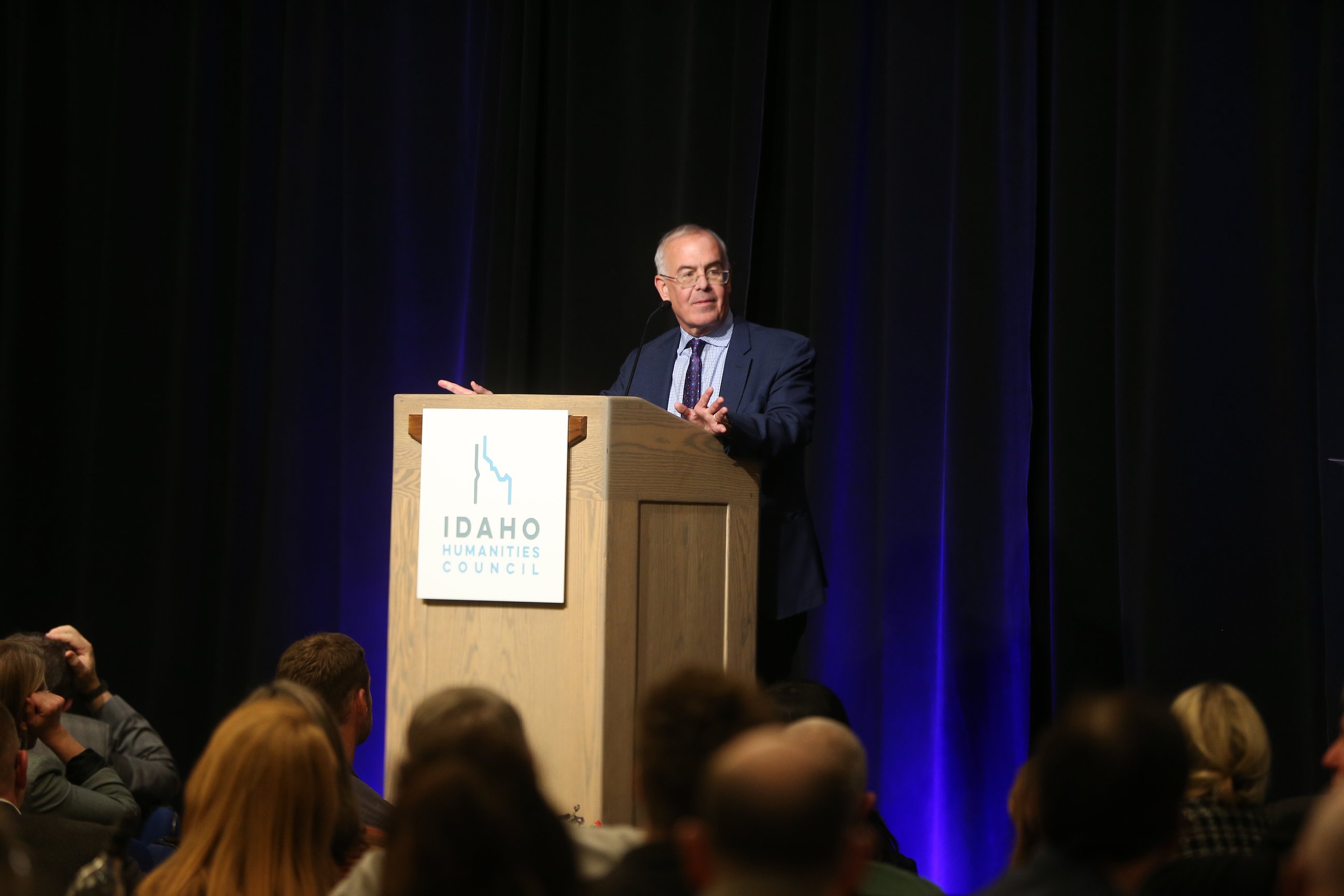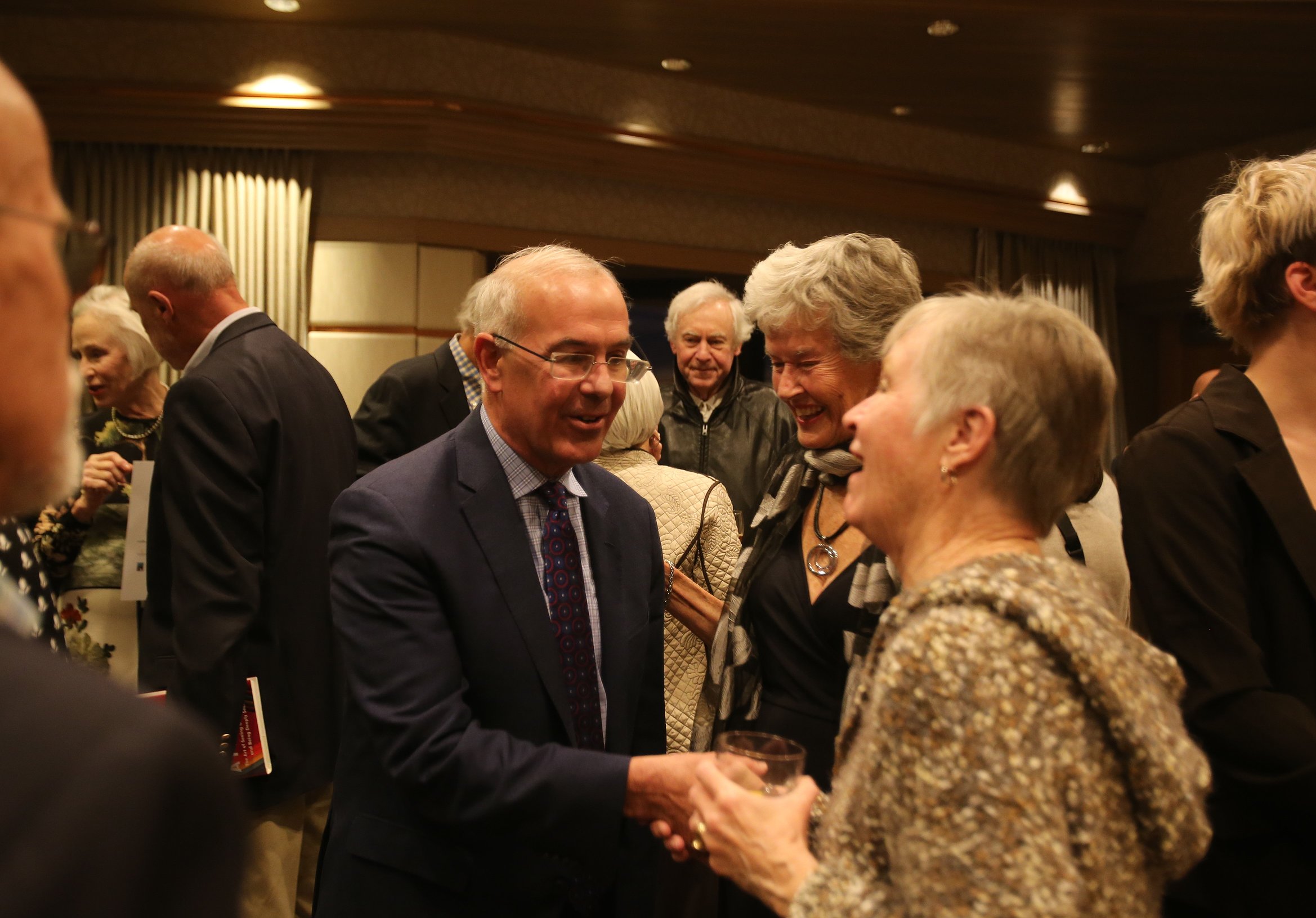David Brooks gives North Idaho Distinguished Lecture
COEUR d’ALENE — A bright light shined on the humanities Thursday evening as David Brooks addressed the largest crowd to ever attend the Idaho Humanities Council’s North Idaho Distinguished Lecture and Dinner at The Coeur d'Alene Resort.
Brooks, a best-selling author and journalist, carried the more than 800 audience members on a poignant and sometimes humorous journey of introspection, reflection and thoughtful communication as he discussed how to inject some humanity into a society riddled with bitter divisiveness.
He shared some of his personal experiences of opening up to others and to life in general.
“The sad thing is, as I was taking a little step toward being more human, the broader American culture has become more dehumanized,” Brooks said.
He spoke of increasing mental health problems, rising suicide and depression rates and how so many Americans feel sad, lonely and isolated.
“When you get sadder, you get meaner, because when you’re not seen or you’re invisible and neglected, you feel under threat and you feel it’s an insult on your dignity, which it is,” Brooks said.
He said some hospitals struggle to keep staff because patients have become so abusive. He touched on the increase in hate crimes and gun violence and other statistics, including how 20 years ago, two-thirds of Americans gave to charity while now fewer than 50% of Americans do.
This dehumanization is happening across society, he said, and people are seeking unity in politics. This seems to give people a sense of community, but it’s not a true community.
“You’re just hating the same people,” he said. “Politics seems to give you the illusion you’re taking moral action on behalf of the country, but you’re not sitting with a widow or serving the poor. You’re just being indignant on Twitter. Politics takes loneliness and turns it into culture wars.”
He said Ryan Streeter of the American Enterprise Institute conducted a study that found that those who say they are lonely are seven times more likely to be involved in politics than other people.
“That makes a lot of sense when you realize our politics is dominated by people who are lonely and angry at the world,” Brooks said.
Several attributable factors include technology, social media, the reduction in community involvement, economics and more.
Above all are basic social skills — how to be good listeners, how to gracefully end conversations, how to appropriately reveal vulnerability, how to break up with someone without crushing their heart, how to host a dinner party where everyone feels included, he said.
“For a couple generations, we have neglected to teach each other how to be considerate to each other in the complex circumstances of life,” Brooks said.
The one skill that tops the rest is the ability to make others feel understood and respected.
Brooks said there are “diminishers” and “illuminators.” Diminishers never ask questions. While pleasant, they’re just not curious and may tend to stereotype others. He said they do what is called “stacking.”
“They learn one fact about you and make a whole series of assumptions about who you must be: ‘You voted for Trump, therefore you must blah, blah, blah,’” he said. “I met a woman at a Trump rally years ago who was a lesbian biker who converted to Sufi Islam after surviving a plane crash. What stereotype does she fit into?”
Illuminators, on the other hand, are curious about others and pay close attention.
How do you become a better illuminator?
“The first thing you do is be deeply involved in the humanities,” Brooks said. “The humanities, these kinds of cultural products, they furnish your mind with emotional knowledge and wisdom. They help you take a richer and more meaningful view of your own experiences. They help you understand, at least a little bit, the depths of another human being. They help you answer the deepest question, which is, ‘How should I live my life?’”
Another step can be found in the gaze of another’s eyes.
“We think as we go through life we’re being measured by how confident we are,” Brooks said, “but mostly we’re being measured by how warm we are.”
Accompaniment — helping others shine — is an important illumination piece; as a pianist gives his attention to a performer, the audience's attention is also pulled in that direction.
The art of conversation is another critical piece of helping others feel understood.
"Treat attention as an on-off switch, not a dimmer," Brooks said. "Make it 100% or 0%, don't 60% it."
Be a loud listener, he said.
"I've got a buddy, when you talk to him, it's like talking to a Pentecostal charismatic church, he's like, 'Yes, yes, yes! Amen, preach that, preach that,'" Brooks said as audience members laughed. "Love talking to that guy."
Don't fear the pause, Brooks advised, and don't be a "topper" who one-ups others.
Finally, he said, to keep the "gem statement" in the center. When conversations become difficult, there is usually something deep down upon which both parties can agree.
 David Brooks addresses the largest crowd to ever attend the Idaho Humanities Council’s annual North Idaho Distinguished Lecture and Dinner at The Coeur d'Alene Resort as he speaks Thursday night on the importance of basic social skills and other aspects of restoring humanity to a dehumanized society.
David Brooks addresses the largest crowd to ever attend the Idaho Humanities Council’s annual North Idaho Distinguished Lecture and Dinner at The Coeur d'Alene Resort as he speaks Thursday night on the importance of basic social skills and other aspects of restoring humanity to a dehumanized society.



